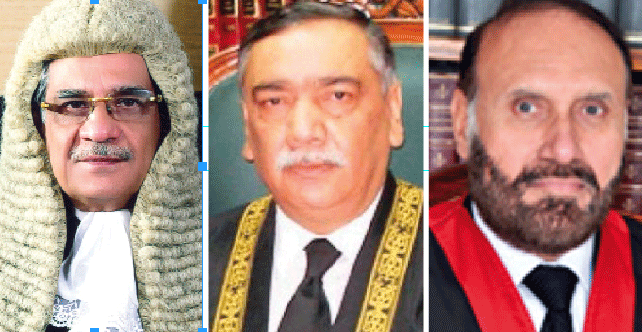The Verdict
By Zoha Liaquat | Cover Story | Published 7 years ago

On Wednesday, October 31, a three-member bench of the Supreme Court, comprising Justices Saqib Nisar, Asif Saeed Khosa and Mazhar Alam Khan Miankhel, passed a monumental verdict striking down the death penalty handed to Aasia Bibi, a Christian woman sentenced to death by the Lahore High Court on charges of blasphemy. The judgement, that is being lauded for its unequivocal and courageous stance on a case that polarised the country and set alarm bells ringing in the West, makes various references to the Quran and Sunnah, detailing why the allegations against the accused were unable to hold ground.
The 56-page long document begins by emphasising that loving and respecting the Holy Prophet (PBUH) is one of the most important tenets of Islam. It highlights the Prophet’s (PBUH) exalted position in Islam and clearly states that no person has the right to defile the name of the Holy Prophet (PBUH) and those who do so, will not be allowed to go ‘scot-free.’
It is evident that those opposing it have probably not bothered to read what the learned judges had to say.
As the judgment explains the origins of the blasphemy law, it is quick to note the possible ways in which it can, and has been misused in the past. It makes reference to Mashal Khan’s brutal murder, which continues to serve as a stark reminder of the gross neglect of the judicial process in the country, and the continued abuse of laws by vested interests.
“Since 1990, 62 people have been murdered as a result of blasphemy allegations, even before their trials could be conducted in accordance with (the) law,” the verdict states, adding that the responsibility of deciding blasphemy cases lies solely with the state, not disgruntled individuals or charged mobs.
Moving forward, it dives into the details of the case, citing several missing links and inconsistencies in eye-witness accounts. One significant fact that casts a shadow of doubt on the case is the delay in registering an FIR. The complainant maintains that he wanted to confirm the allegations before taking them to the authorities, but the apex court finds his explanation questionable.
The second critical reason cited for overturning the judgement is that both Mafia and Asma Bibi, the two key witnesses of the case deviated from their statements through the course of the investigation – a fact that was totally ignored in the lower courts. Commenting on the glaring material inconsistencies in the accounts of all eye-witnesses, Justice Saqib Nisar notes that the accused is entitled to the benefit of doubt, “not as a matter of grace and concession, but as of right.” Although not stated directly, the judgement is a clear indicator of judicial incompetence of the lower courts in the country, and one wonders about the credibility of the verdicts passed in similar cases of a sensitive nature that did not get the kind of media attention that Aasia Bibi’s case did.
In his concluding remarks on the case, Chief Justice Saqib Nisar observes that the prosecution had “categorically failed to prove its case beyond reasonable doubt,”
Justice Asif Saeed Khosa – who also presided over the bench that handed Mumtaz Qadri the death sentence for the murder of then Punjab Governor, Salmaan Taseer – while evaluating the evidence provided by the prosecution, notes that while attention was given to the alleged “blasphemous” remarks made by Aasia Bibi, neither the eye-witness accounts, nor the FIR made any mention of the fact that the key witnesses of the case, Mafia and Asma Bibi, passed derogatory remarks against Aasia Bibi’s religion, following a quarrel. Disrespecting Aasia’s religion and concocting a false story in the name of the Holy Prophet himself was “nothing short of blasphemous,” he remarks.
Highly critical of the prosecution’s version of events, he adds that the events that transpired in the public gathering where Aasia Bibi allegedly confessed to her crime were “nothing short of concoction incarnate.”
Justice Khosa too makes a reference to the Holy Quran to substantiate his comments on the case. Evidently a man of great literary flair, Justice Khosa also makes reference to the English playwright William Shakespeare’s King Lear, noting that in light of the events of the case, Aasia Bibi was “more sinned against than sinning.”
A journalism graduate, Zoha's core areas of interest include human and gender rights issues, alongside which she also writes about gender representation in the media and its impact on society.


